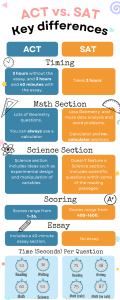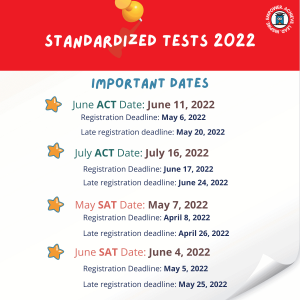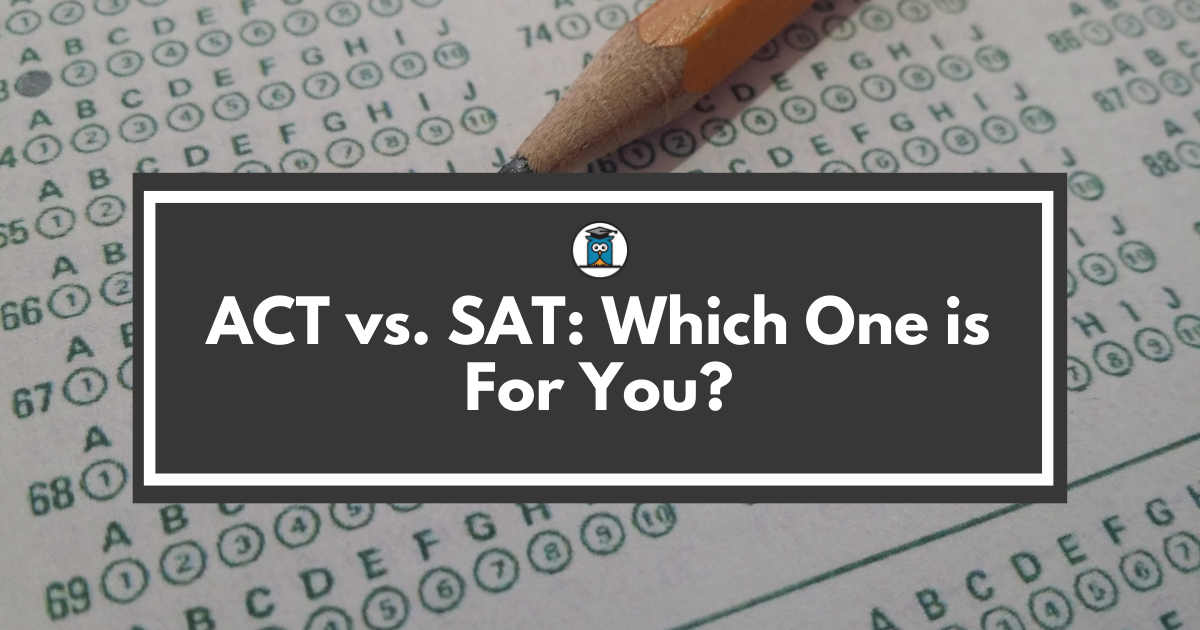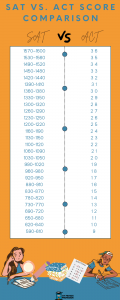When your high school years are coming to a close and you’re ready to hit the ground running, you may have to push through one more task before applying to college: making the decision of taking the ACT vs. SAT.
The ACT and SAT can be daunting, particularly if you don’t feel as though you have the knowledge or tools to prepare. That’s why it’s useful to look at a full rundown of both tests, understanding the similarities and differences.
While some students have the privilege of taking both tests, this isn’t an option for others due to costs or physical proximity. And it can be overwhelming to buckle down and commit to one or the other if you don’t really know the difference between the two tests.
Although the differences between the ACT and SAT may appear seem minor, some of them can significantly affect your score. To decide which test you want to take and send to colleges, consider each key difference around the ACT vs. SAT.
ACT vs. SAT rundown
Structure
One key way in which these two tests differ from one another is their structures.
While the SAT has three sections, the ACT has four. The SAT has reading, writing & language, & math section; the ACT features reading, English, math, and science reasoning.
Additionally, as of 2021, only the ACT will offer the optional essay component. If quickly analyzing and responding to a passage is your strong suit, then this might be your golden opportunity to shine. Or, this may be a dealbreaker if you cringe at the thought of pumping out a coherent response after sitting through the entire test.
Time
Time allotted per question can be a game-changer for some students—especially, if you either crumble or thrive under pressure. If the former applies to you, you might prefer the SAT, since you’ll have more time in each section to answer the questions.
In each section, the SAT offers more time per question. The following table by PrepScholar illustrates these differences:
| ACT | SAT | |
| Reading | 53 sec/question | 75 sec/question |
| ACT English/SAT Writing | 36 sec/question | 48 sec/question |
| Math | 60 sec/question |
No Calculator: 75 sec/question Calculator: 87 sec/question |
| Science | 53 sec/question | N/A |
All in all, if you include the essay portion on the ACT, the SAT is the shorter test. If you know you won’t be doing the essay question, you can take this factor out of the equation—but regardless, the SAT still offers more time per question.
ACT vs. SAT score range
Another difference between the two tests is their score ranges. Below is a chart that shows the ACT vs. SAT scoring ranges, which you can use to convert yours scores between the tests.
While the different score ranges don’t really affect which test you’re going to take, this type of chart is helpful to have once you’ve taken one of the tests. Even if you’re not planning to take both, you can look at how your ACT practice score might convert to an SAT score and vice versa.
And once you’ve taken several practice tests, you can use this chart to see where you stand when it comes to score thresholds for different schools.
Science section
One major difference, which is a tipping-point for many students, is that the ACT includes a science section, while the SAT does not.
However, it’s important to note that the science section on the ACT doesn’t truly test students’ science knowledge/skills, but instead, their reading comprehension ability—not only around text, but also graphs and tables. While the text may focus on scientific topics, the questions require more text analysis than science knowledge. In that way, the science section is extremely similar to the reading section.
So if you excel at answering questions based on passages and graphs(that you’ll read in a short period of time), the ACT may be the one for you.
Math section
If you’re looking for something devoid of math, you’re unfortunately out of luck. But luckily, there are some differences between ACT and SAT math sections that may influence which test you take.
One key difference is that the SAT has two math sections: one on which you’re allowed a calculator, and one where you solely have your brain. (This isn’t to say that it’s more heavy on math—both tests have a very similar amount of math!)
The type of questions you’ll face are also somewhat different. On one hand, the ACT features math questions that are usually pretty straightforward and not aiming to test you on reading comprehension, but the actual concept.
The SAT, on the other hand, is big on giving questions that involve some reading comprehension and data analysis.
In essence, the ACT is a bit more straightforward, while the SAT takes a little more thinking outside of the box. For instance, the ACT often features more questions on broad topics such as geometry and trigonometry, while the SAT tends to highlight word problems, testing your skills in applying knowledge to real-life situations.
Reading
The one considerable difference between the reading sections on the ACT vs. SAT is that the ACT generally requires you to read or at least skim the entire passage. On the contrary, for the SAT reading section, you can usually succeed by simply reading the questions and finding the answers in the passage. This means that if you’re worried about time pressure, you might do better with the SAT.
The ACT reading questions don’t follow any type of order, while the SAT reading questions are usually chronologically arranged regarding what occurs in the passage.
If you excel at quickly remembering small details from a passage, you may find that the ACT is the test for you. If reading a lot of text in a short period of time and then answering randomly ordered questions isn’t for you, the SAT might be a better choice.
ACT vs. SAT: still don’t know which to take?
Don’t worry—you’re certainly not alone in this struggle. Students (myself included) often take their time to figure out which test is best for them. If you have the option, it’s very helpful to take diagnostic tests for both the ACT and SAT.
This type of practice test can help you figure out where your strengths and weaknesses lie, and if one test is more up your alley than the other.
You can also seek external help. Maybe your parents or siblings have gone through this process, and can provide you with some insight. Don’t forget about your friends! They’re going through this, too—and although discussing standardized tests may feel a little awkward, chances are, they’ll appreciate the chance to voice their concerns, questions, and challenges.
Of course, many students will seek support from their teachers, advisors, or tutors. Some students are going back to remote work, so this may be a challenge. If you don’t have resources at school that can offer you the support you need, consider looking at online resources.
Online tutors, such as those at My Private Professor, can support you by providing helpful tools, advice, and suggestions for deciding which standardized test to take.
Author: Lydia Schapiro





